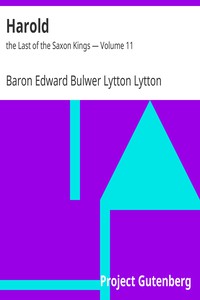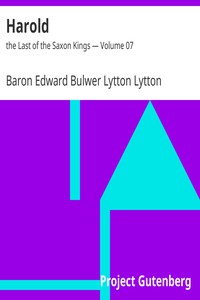Harold : the Last of the Saxon Kings — Complete by Lytton (good books for 8th graders .TXT) 📗

- Author: Lytton
Book online «Harold : the Last of the Saxon Kings — Complete by Lytton (good books for 8th graders .TXT) 📗». Author Lytton
“Sir, and father,” replied the young Earl, whom the long speech addressed to him had prepared for its close, and whose habitual self-control saved him from disclosing his emotion, “I thank you duteously, for your care for my future, and hope to profit by your wisdom. I will ask the King’s leave to go to my East Anglians, and hold there a folkmuth, administer justice, redress grievances, and make thegn and ceorl content with Harold, their Earl. But vain is peace in the realm, if there is strife in the house. And Aldyth, the daughter of Algar, cannot be house-wife to me.”
“Why?” asked the old Earl, calmly, and surveying his son’s face with those eyes so clear yet so unfathomable.
“Because, though I grant her fair, she pleases not my fancy, nor would give warmth to my hearth. Because, as thou knowest well, Algar and I have ever been opposed, both in camp and in council; and I am not the man who can sell my love, though I may stifle my anger. Earl Harold needs no bride to bring spearmen to his back at his need; and his lordships he will guard with the shield of a man, not the spindle of a woman.”
“Said in spite and in error,” replied the old Earl, coolly. “Small pain had it given thee to forgive Algar old quarrels, and clasp his hand as a father-in-law—if thou hadst had for his daughter what the great are forbidden to regard save as a folly.”
“Is love a folly, my father?”
“Surely, yes,” said the Earl, with some sadness—“surely, yes, for those who know that life is made up of business and care, spun out in long years, nor counted by the joys of an hour. Surely, yes; thinkest thou that I loved my first wife, the proud sister of Canute, or that Edith, thy sister, loved Edward, when he placed the crown on her head?”
“My father, in Edith, my sister, our House has sacrificed enow to selfish power.”
“I grant it, to selfish power,” answered the eloquent old man, “but not enow for England’s safety. Look to it, Harold; thy years, and thy fame, and thy state, place thee free from my control as a father, but not till thou sleepest in thy cerements art thou free from that father—thy land! Ponder it in thine own wise mind—wiser already than that which speaks to it under the hood of grey hairs. Ponder it, and ask thyself if thy power, when I am dead, is not necessary to the weal of England? and if aught that thy schemes can suggest would so strengthen that power, as to find in the heart of the kingdom a host of friends like the Mercians;—or if there could be a trouble and a bar to thy greatness, a wall in thy path, or a thorn in thy side, like the hate or the jealousy of Algar, the son of Leofric?”
Thus addressed, Harold’s face, before serene and calm, grew overcast; and he felt the force of his father’s words when appealing to his reason—not to his affections. The old man saw the advantage he had gained, and prudently forbore to press it. Rising, he drew round him his sweeping gonna lined with furs, and only when he reached the door, he added:
“The old see afar; they stand on the height of experience, as a warder on the crown of a tower; and I tell thee, Harold, that if thou let slip this golden occasion, years hence—long and many—thou wilt rue the loss of the hour. And that, unless Mercia, as the centre of the kingdom, be reconciled to thy power, thou wilt stand high indeed—but on the shelf of a precipice. And if, as I suspect, thou lovest some other who now clouds thy perception, and will then check thy ambition, thou wilt break her heart with thy desertion, or gnaw thine own with regret. For love dies in possession—ambition has no fruition, and so lives forever.”
“That ambition is not mine, my father,” exclaimed Harold, earnestly; “I have not thy love of power, glorious in thee, even in its extremes. I have not thy——”
“Seventy years!” interrupted the old man, concluding the sentence. “At seventy all men who have been great will speak as I do; yet all will have known love. Thou not ambitious, Harold? Thou knowest not thyself, nor knowest thou yet what ambition is. That which I see far before me as thy natural prize, I dare not, or I will not say. When time sets that prize within reach of thy spear’s point, say then, ‘I am not ambitious!’ Ponder and decide.”
And Harold pondered long, and decided not as Godwin could have wished. For he had not the seventy years of his father, and the prize lay yet in the womb of the mountains; though the dwarf and the gnome were already fashioning the ore to the shape of a crown.
CHAPTER VI.
While Harold mused over his father’s words, Edith, seated on a low stool beside the Lady of England, listened with earnest but mournful reverence to her royal namesake.
The Queen’s 113 closet opened like the King’s on one hand to an oratory, on the other to a spacious ante-room; the lower part of the walls was covered with arras, leaving space for a niche that contained an image of the Virgin. Near the doorway to the oratory, was the stoupe or aspersorium for holy-water; and in various cysts and crypts, in either room, were caskets containing the relics of saints. The purple light from the stained glass of a high narrow window, shaped in the Saxon arch, streamed rich and full over the Queen’s bended head like a glory, and tinged her pale cheek, as with a maiden blush; and she might have furnished a sweet model for early artist, in his dreams of St. Mary the Mother, not when, young and blest, she held the divine infant in her arms, but when sorrow had reached even the immaculate bosom, and the stone had been rolled over the Holy Sepulchre. For beautiful the face still was, and mild beyond all words; but, beyond all words also, sad in its tender resignation.
And thus said the Queen to her godchild:
“Why dost thou hesitate and turn away? Thinkest thou, poor child, in thine ignorance of life, that the world ever can give thee a bliss greater than the calm of the cloister? Pause, and ask thyself, young as thou art, if all the true happiness thou hast known, is not bounded to hope. As long as thou hopest, thou art happy.”
Edith sighed deeply, and moved her young head in involuntary acquiescence.
“And what is life to the nun, but hope. In that hope, she knows not the present, she lives in the future; she hears ever singing the chorus of the angels, as St. Dunstan heard them sing at the birth of Edgar 114. That hope unfolds to her the heiligthum of the future. On earth her body, in heaven her soul!”
“And her heart, O Lady of England?” cried Edith,





Comments (0)